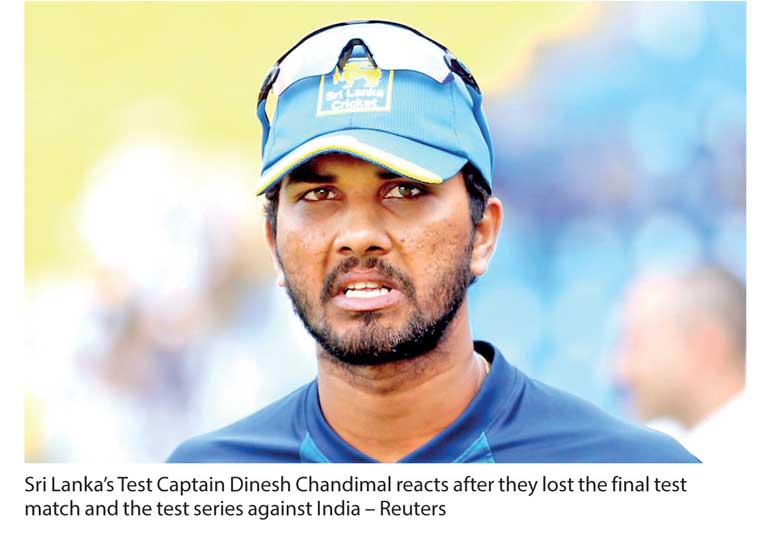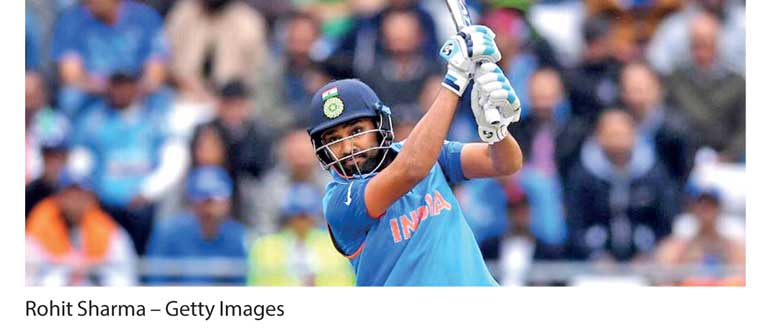Sunday Feb 22, 2026
Sunday Feb 22, 2026
Friday, 18 August 2017 00:00 - - {{hitsCtrl.values.hits}}
 REUTERS: Two years have passed since Sri Lanka bid farewell to the last of their batting greats yet the South Asian side appears no nearer to ending what has been a difficult period of transition.
REUTERS: Two years have passed since Sri Lanka bid farewell to the last of their batting greats yet the South Asian side appears no nearer to ending what has been a difficult period of transition.
When the brilliant Kumar Sangakkara followed the equally prolific Mahela Jayawardene into retirement in 2015, even the most optimistic Sri Lankan fans acknowledged the void they left was simply too big to be filled overnight.
What they probably did not anticipate was that two years down the line, the team would still be hopelessly in the throes of a seemingly interminable era of regeneration.
Once admired, even envied, for their steady supply of freak bowlers with bizarre actions and a near-invincible record at home, Sri Lanka’s recent humiliating 3-0 whitewash at the hands of India made for a particularly painful watch.
Only Kusal Mendis and Dimuth Karunaratne offered fleeting glimpses of batting prowess but Sri Lanka were otherwise completely outclassed by the tourists in one of the most lop-sided series of recent times.
“Since I’ve been in this team, this is the worst series loss I’ve experienced,” test skipper Dinesh Chandimal said after his team lost three matches in 11 days against their neighbours.
The debacle followed their first ever one-day series loss to Zimbabwe in July, which prompted a frustrated Angelo Mathews to relinquish the captaincy of both the test and one-day sides.
Mathews appeared to have sparked a revival last year when they whitewashed Australia but the 3-0 home win proved little more than a false dawn.
Sri Lanka were subsequently thrashed in both tests and one-dayers in South Africa, lost a home test against Bangladesh and then failed to progress beyond the group stage at this year’s Champions Trophy.
The India whitewash has led the country’s sports ministry to call for a report from Sri Lanka Cricket (SLC) to explain why the side performed so poorly, while former captain Aravinda de Silva believes the board lacks vision.
“We are going through a rebuilding process but you can’t be saying that forever,” de Silva, hero of Sri Lanka’s 1996 World Cup triumph, told the Hindu newspaper last week.
“Short-term process is good for a few months, one or two series, but not for the future.
“So we need to seriously look at the team in the long-term and not keep chopping and changing,” said de Silva, who quit as head of the board’s cricket committee in May.
His former team mate and chief selector Sanath Jayasuriya pointed to a string of injuries as one reason for the side’s struggles and dismissed allegations of leading a trigger-happy panel.
“Why should we change a squad of players if they are performing well and are injury free?” he told reporters. “Do you know how many players have been injured in the last 14 months?”
Asela Gunaratne missed a majority of the series after fracturing his hand on the first day of the opening test and paceman Nuwan Pradeep was sidelined after picking up a hamstring injury in the second test.
Rangana Herath, who has helped Sri Lanka overcome the loss of retired spin great Muttiah Muralitharan, missed the final test with a stiff back.
Sri Lanka were twice subjected to being made to follow-on and a lack of balance was evident as they failed to stretch any of the three tests to a full five days.
Jayasuriya sought to explain the lack of competitiveness.
“For instance, Mathews is not bowling after his hamstring injury,” the former captain said of the all-rounder.
“He used to bowl at least 15 overs in a test innings earlier but now plays purely as a batsman. So it’s very difficult to get the right balance when your key all-rounder is not bowling.”
 ESPNcricinfo: Rohit Sharma has never officially been a part of the Indian team’s leadership group, not even in limited-overs cricket, where he has established himself with consistent performances. Now, after ten years in international cricket, Rohit has been named the vice-captain of the Indian team for their five-match ODI series against Sri Lanka that starts on August 20.
ESPNcricinfo: Rohit Sharma has never officially been a part of the Indian team’s leadership group, not even in limited-overs cricket, where he has established himself with consistent performances. Now, after ten years in international cricket, Rohit has been named the vice-captain of the Indian team for their five-match ODI series against Sri Lanka that starts on August 20.
«It›s an honour to be appointed vice-captain. Ten years ago, I was only thinking about playing for India. Being vice-captain now feels really good,» Rohit said at a press conference in Pallekele, two days after India crushed Sri Lanka by an innings and 171 runs in the third Test to win the series 3-0. “Whenever the opportunity comes, in the first one-day international on August 20, there will be some sort of role I have to play. I’m looking forward to it. Rather than thinking too much about it, I just want to enjoy the moment.”
Rohit isn›t new to captaincy. He brings along not just the experience of having led teams, but having done so with outstanding success. Since taking over from Ricky Ponting halfway through the 2013 season, Rohit has led Mumbai Indians to three IPL titles in five seasons.
«IPL is a completely different ball game and international cricket is completely different,» he said. «But, yes, the excitement and energy remain the same, so nothing changes too much. In the IPL, I was captain, so I was more in front; here, I have to play a little behind-the-scenes role, but yes, I›ll be very excited to step on to the field as vice-captain of the Indian team.»
Rohit took no part in the Tests, where India swept a series of three or more matches for the first time outside home. Rohit had just started to be picked consistently in the Test side at the start of India›s home season last year. He struck three half-centuries in three Tests against New Zealand, but a thigh injury sustained in the ODIs put him out of the rest of the season. Though he was recalled to the Test side for the Sri Lanka tour, he had to be overlooked to accommodate an allrounder in Hardik Pandya.
“Nobody likes to sit out, but it all depends on the team dynamics, and what the captain and coach want, and you got to accept the fact and move forward,” Rohit said. “I kept working on my skills and tried to see where I can improve as a cricketer. You can’t sit here and waste time. All I was trying to do these past three-four weeks was to just improve my skills, see where things are going wrong, and try and strengthen the strengths I have talking to all the coaches there. They’ve been looking after us for a long time and they know what exactly has been going on with each individual. You always try to improve as a cricketer. It was great to watch everyone displaying their skills and winning 3-0 outside India. Great achievement.”
Rohit placed particular emphasis on the sweep - both conventional and reverse - during the team’s training session on Wednesday. Sri Lanka’s squad has five spinners. While Malinda Pushpakumara is uncapped in ODIs, he comes with a shedload of first-class wickets, and Wanindu Hasaranga and Lakshan Sandakan did well in the ODIs against Zimbabwe.
“It’s something that the game demands these days, you’ve got to be innovative and play different kinds of shots to get maximum results,”Rohit said. “Like I said, you keep learning every day, so I have been trying to see what I can bring into my armoury. Every addition to your armoury is a good thing, and what better place than coming here and doing it. That’s what training sessions are for – to improve your skills and try and get better as a player.”
Rohit reflected on a decade-long international journey that has been filled with ups and downs. “It’s gone very fast, those 10 years. Of course, there have been ups and downs, but that’s how it is for any sportsman. That’s how it should be, you get to learn a lot more from ups and downs, it teaches you lot many things.
“Every day is a learning day. Today, I got to learn something playing those sweeps and reverse sweeps. That’s the opportunity I always wait for, to get on to the field and learn something. Initially, in limited-overs, I used to play too many shots at once. Now, I have realised it cannot be just about going out there and slogging every time, you’ve got to understand the situation and conditions. That is something I have learned these few years with the help of so many coaches around. I will continue to learn, you never stop learning. That’s the greatest part about this sport. There’s lot more to do and I look forward to it.”